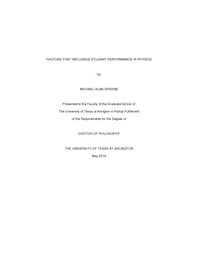
ATTENTION: The works hosted here are being migrated to a new repository that will consolidate resources, improve discoverability, and better show UTA's research impact on the global community. We will update authors as the migration progresses. Please see MavMatrix for more information.
Show simple item record
| dc.contributor.advisor | Lopez, Ramon E. | |
| dc.creator | Greene, Michael Alan | |
| dc.date.accessioned | 2018-06-05T16:30:07Z | |
| dc.date.available | 2018-06-05T16:30:07Z | |
| dc.date.created | 2018-05 | |
| dc.date.issued | 2018-04-12 | |
| dc.date.submitted | May 2018 | |
| dc.identifier.uri | | |
| dc.identifier.uri | http://hdl.handle.net/10106/27376 | |
| dc.description.abstract | This study is composed of several projects in the field of physics education research. First, Investigations into flipped physics classrooms at the senior and graduate level show that students uniformly agree that the active learning techniques (peer instruction, group problem solving, etc.) were beneficial to their learning regardless of their feelings toward the flipped format of the class. One possible impact of flipping graduate-level physics courses is an increase in pass rates on the relevant section of the departmental graduate qualifying exam. Next, in the calculus-based introductory physics course, a novel statistical methodology called nonlinear casual resource analysis was used to construct predictive models of student performance based on widely-accepted factors that influence performance in physics courses. The prediction efficiency of the model was compared to traditional linear and nonlinear regression models using dichotomous forecasting, and results from the two different approaches come to similar conclusions. Finally, certain measures of cognitive ability (scientific reasoning, mental rotation ability, mathematics proficiency etc.) and affective beliefs were studied longitudinally in students enrolled in PHYS 1443 from semester to semester. Some of those factors were also studied “vertically” as they were measured in higher level physics courses including a graduate course. Trends in the descriptive statistics are reported for UTA students as well as comparisons to TCU and Yale University students. | |
| dc.format.mimetype | application/pdf | |
| dc.language.iso | en_US | |
| dc.subject | Flipped classroom | |
| dc.subject | Active learning | |
| dc.subject | Linear regression | |
| dc.subject | Multivariate regression | |
| dc.subject | Nonlinear regression | |
| dc.subject | General systems performance theory | |
| dc.subject | Trends | |
| dc.title | FACTORS THAT INFLUENCE STUDENT PERFORMANCE IN PHYSICS | |
| dc.type | Thesis | |
| dc.degree.department | Physics | |
| dc.degree.name | Doctor of Philosophy in Physics and Applied Physics | |
| dc.date.updated | 2018-06-05T16:31:10Z | |
| thesis.degree.department | Physics | |
| thesis.degree.grantor | The University of Texas at Arlington | |
| thesis.degree.level | Doctoral | |
| thesis.degree.name | Doctor of Philosophy in Physics and Applied Physics | |
| dc.type.material | text | |
Files in this item
- Name:
- GREENE-DISSERTATION-2018.pdf
- Size:
- 2.330Mb
- Format:
- PDF
This item appears in the following Collection(s)
Show simple item record


